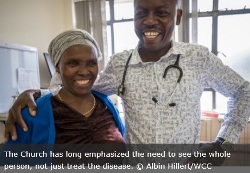
Contact: World Council of Churches,
+41-79-507-6363;
www.oikoumene.org/press
GENEVE, May 25, 2017 /Christian Newswire/ -- Convening a range of international representatives and partners in Geneva on 24 May, the World Council of Churches (WCC) reiterated its commitment to the ministry of health and healing for all people, taking new steps towards a new Global Ecumenical Health Strategy.
Stressing the uniting power of the ecumenical community, WCC general secretary Rev. Dr Olav Fykse Tveit reflected that "while we acknowledge changing landscapes, we see that many health challenges still remain today."
"As the World Council of Churches, we commit ourselves to continue to play our role as convenor, facilitator and catalyst," said Tveit, and added, "we need to agree now, on how to gather data, to analyse them, to use our advocacy in the relevant contexts and towards key institutions, and to remain steadfast. Our calling to health and healing is as strong as ever."
"The church remains a key player in working for sustainable development, and particularly in health," added Dr Mwai Makoka, WCC programme executive for Health and Healing. "The Sustainable Development Goals cannot be reached without the active participation of the church, and it is clear that health is not just an add-on, but an integral part of the Church's ministry."
"We need to bring back 'the person' into our work on healthcare," said Dr Cherian Varghese, coordinator for Management of Non- communicable Diseases at the World Health Organization. "We can see that the policies we make are often for those who do not themselves have a voice in the policy-making process. The ecumenical movement can have an important role to play in changing this, to help bring them to the table."
Dr Christoph Benn, director of External Relations at the Global Fund to Fight AIDS, Tuberculosis and Malaria, further reflected on the value of the work done by Christian Health Associations around the world, and the role the WCC has played in helping to establish them. "We cannot underestimate the importance of that work in many countries," Benn said. "So the focus now needs to be on strengthening these networks, and reviewing, where do we need to add to such networks."
Benn also made the connection to issues of justice that so often hamper the work towards healthcare for all people. "Among the obstacles are often not just scarcity of resources or lack of health professionals. What is holding us back is often conflict. And faith communities are essential here, in creating environments for dialogue," Benn said.
"The work on the ecumenical health strategy will form part of the broader WCC's framework of the Pilgrimage of Justice and Peace," concluded WCC deputy general secretary responsible for Public Witness and Diakonia, Prof. Dr Isabel Apawo Phiri.
"We can see that partnerships are crucial in implementing such a health strategy, and as we have been reminded, in 2018 it will be 50 years since the Christian Medical Commission was first formed, as well as 70 years since the formation of the WCC. It will be a good time to launch and begin to implement a new ecumenical health strategy."
"Health and healing for all people, that is the challenge" (WCC press release of 28 February 2017)
WCC to develop Global Ecumenical Health Strategy, starting in Lesotho (WCC press release of 23 February 2017)
WCC work on Health and Healing

